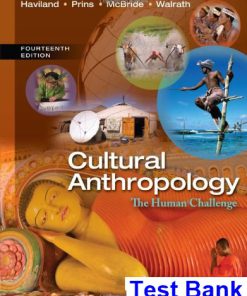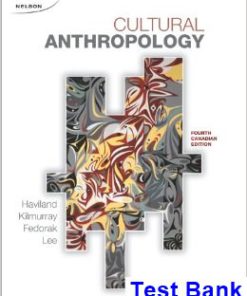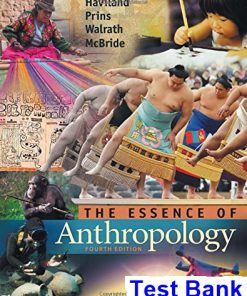PKG Cultural Anthropology 4th Edition Haviland Test Bank
You may also like
PKG Cultural Anthropology 4th Edition Haviland Test Bank

Product details:
- ISBN-10 : 0176648801
- ISBN-13 : 978-0176648800
- Author: William A. Haviland
Cultural Anthropology, Fourth Canadian Edition, has been thoroughly updated to reflect the current trends and research in sociocultural anthropology. Drawing research and ideas from a number of schools of anthropological thought, this text exposes students to a mix of perspectives and challenges them to think critically about the true complexity and breadth of human behaviour and the human condition. With its invigorated writing, comprehensive coverage, robust art program, and relevant and engaging ethnographic examples, this text provides students with a comprehensive introduction to sociocultural anthropology.
Table contents:
Part I: Basic Concepts of Anthropology
Chapter 1: Introduction to Anthropology
Anthropology: The Four Subfields
Holistic Anthropology, Interdisciplinary Research, and the Global Perspective
Anthropological Explanations
Humanistic-Interpretive Approaches in Anthropology
Why Study Anthropology?
Summary and Review of Learning Objectives/Key Terms
Chapter 2: Human Evolution
Theory of Evolution
The Scientific Revolution
Darwin, Wallace, and Natural Selection
Hominin Evolution
Homo
Homo Erectus
Transition to Homo Sapiens
The Evolution of Modern Homo Sapiens
Modern Homo Sapiens Culture: The Upper Paleolithic
Skin Color
Summary and Review of Learning Objectives/Key Terms
Chapter 3: Culture
The Characteristics of Culture
Culture is Learned
Culture is Shared
Aspects of Culture
Cultural Diversity
Cultural Universals
Summary and Review of Learning Objectives/Key Terms
Chapter 4: The Process of Enculturation: Psychological and Cognitive Anthropology
Biology versus Culture
Instincts and Human Nature
Enculturation: Culture and Personality
Psychoanalytic Approaches in Anthropology
Enculturation and Cognition
Cognitive Anthropology
Evolutionary Psychology
Enculturation and Emotions
Neuroanthropology
The Limits of Enculturation
Summary and Review of Learning Objectives/Key Terms
Chapter 5: Language
Nonhuman Animal Communication
Animal Communication versus Human Language
The Evolution of Language
The Structure of Language
Language Acquisition
Language, Thought, and Culture
Historical Linguistics
Sociolinguistics
Nonverbal Communication
Summary and Review of Learning Objectives/Key Terms
Chapter 6: Anthropological Explanations
Nineteenth-Century Evolutionism
Diffusionism
Historical Particularism
Functionalism
Twentieth-Century Evolutionism
Marxist Anthropology
Symbolic Anthropology: A Humanistic Method of Inquiry
Feminist Anthropology
Postmodernism and Anthropology
Twenty-First-Century Cultural Evolution
Summary and Review of Learning Objectives/Key Terms
Chapter 7: Analyzing Sociocultural Systems
Ethnographic Fieldwork
Ethnographic Research and Strategies
Ethics in Anthropological Research
Analysis of Ethnographic Data
Sociocultural Evolution: A Contemporary Model
Types of Sociocultural Systems
Cross-Cultural Research
Summary and Review of Learning Objectives/Key Terms
Part II: Studying Different Societies
Chapter 8: Environment, Subsistence, and Demography
Subsistence and the Physical Environment
Demography
Modern Foraging Environments and Subsistence
Demographic Conditions for Foragers
Environment and subsistence for Horticulturalists and Pastoralists
Demographics and Settlement
Environment, subsistence, and Demography for Chiefdoms
Environment and Demography in Agricultural States
Environment and Energy Use in Industrial and Postindustrial Societies
Demographic Change
Summary and Review of Learning Objectives/Key Terms
Chapter 9: Technology and Economics
Anthropological Explanations of Technology
Anthropology and Economics
Technology in Foraging Societies
Economics in Foraging Societies
Technology among Horticulturalists and Pastoralists
Economics in Horticulturalist and Pastoralist Societies
Technology in Chiefdoms
Economics in Chiefdoms
Technology in Agricultural States
Economics in Agricultural States
Technology and Economic Change in Industrial and Postindustrial Societies
Summary and Review of Learning Objectives/Key Terms
Chapter 10: Social Structure, the Family, Marriage, and Age
Social Structure
Understanding Incest Avoidance and the Incest Taboo
Age
Social Structure in Hunter-Gatherer Societies
Social Structure in Tribes
Social Structure in Chiefdoms
Social Structure in Agricultural States
Social Stratification in Agricultural States
Social Structure in Industrial and Postindustrial Societies
Social Stratification in Industrial and Postindustrial Societies
Summary and Review of Learning Objectives/Key Terms
Chapter 11: Gender and Sexuality
The Complexities of Sex
The Complexities of Gender
Transgender and LGBTQ Individuals
Gender in Foraging Societies
Gender in Tribal Societies
Patriarchy in Tribal Societies
Gender in Chiefdom Societies
Gender in Agricultural States
Gender in Industrial and Postindustrial Societies
Gender in Latin America, Africa, the Middle East, and Asia
Sexuality in Different Societies
Summary and Review of Learning Objectives/Key Terms
Chapter 12: Politics, Warfare, and Law
Politics, Warfare, and Law
Political Organization in Foraging Societies
Warfare and Violence in Foraging Societies
Political Organization in Horticulturalist and Pastoralist Tribes
Explaining Tribal Warfare
Political Authority in Chiefdoms
The Evolution of Chiefdoms
Politics in Agricultural States
Political Organization in Industrial and Postindustrial States
Warfare and Industrial Technology
Summary and Review of Learning Objectives/Key Terms
Chapter 13: Religion and Aesthetics
Religion
Myths and Rituals
Rites of Passage
Cognition and Religion
Aesthetics: Art and Music
Religion among Foragers
Art, Music, and Religion among Foragers
Religion among Horticulturalists and Pastoralists
Religion in Chiefdoms
Art, Architecture, and Music in Chiefdoms
Religion in Agricultural States
Art, Architecture, and Music in Agricultural States
Religion and Secularization in Industrial and Postindustrial Societies
Art and Music in Industrial and Postindustrial Societies
Summary and Review of Learning Objectives/Key Terms
Part III: Globalization and its Impact
Chapter 14: Globalization, Culture, and Indigenous Societies
Globalization: A Contested Term
Globalization: Technological and Economic Trends
Globalization: General Theoretical Approaches
Anthropological Analysis and Globalization
Globalization, Politics, and Culture
Globalization and Indigenous Peoples
Forms of Resistance among Indigenous Peoples
Pro- and Anti-Globalization: An Anthropological Contribution
Summary and Review of Learning Objectives/Key Terms
Chapter 15: Globalization, Colonialism, and Postcolonialism
Globalization and Colonialism
Consequences of Globalization and Colonialism
Political Changes: Independence and Nationalist Movements
Uneven Economic Development
Ethnographic Studies
Social Structure in Postcolonial Societies
Patterns of Ethnicity
Summary and Review of Learning Objectives/Key Terms
Chapter 16: Race and Ethnicity
Race, Racism, and Culture
Modern Racism in Western Thought
Critiques of Scientific Racism
The Cultural and Social Significance of Race
Ethnicity
Anthropological Perspectives on Ethnicity
Patterns of Ethnic Relations
Ethnic Relations in the United States
Ethnonationalism
Summary and Review of Learning Objectives/Key Terms
Chapter 17: Applied Anthropology
The Roles of the Applied Anthropologist
The Roles of the Applied Anthropologist in Planned Change
Applied Anthropology, Climate Change, and Sustainability
Medical Anthropology
Cultural Resource Management: Applied Archaeology
Applied Anthropology and Human Rights
Summary and Review of Learning Objectives/Key Terms
People also search:
cultural anthropology 4th canadian edition
|
anthropology 4
|
cultural anthropology curriculum
phd cultural anthropology
anthropology unit 4












